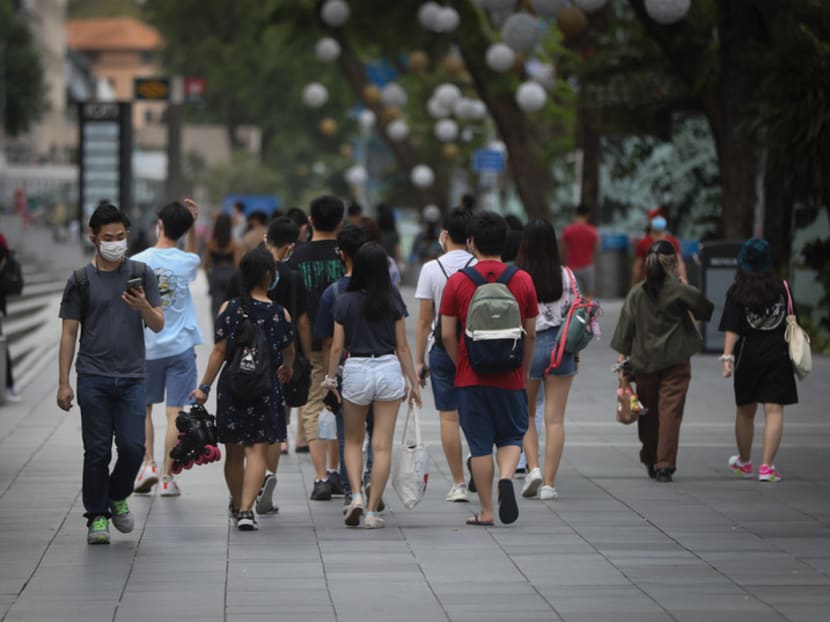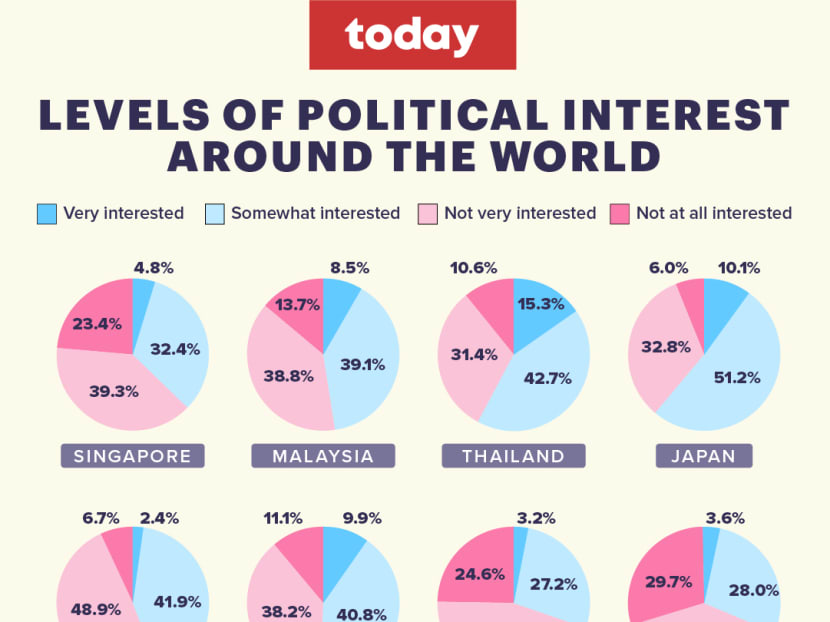Most S’poreans aren’t interested in politics, but feel strongly about some policy issues: IPS study
SINGAPORE — More than half of the people here are not interested in politics, placing Singapore among some of the most politically apathetic countries polled, a study by the Institute of Policy Studies (IPS) has found.

Interest in politics in Singapore is among the lowest among 80 countries in a global poll, an IPS study found.
- Around 37.2 per cent of Singapore residents polled said they were interested in politics
- Hong Kong and Taiwan had similar levels of political apathy
- Nearly all Singapore residents were satisfied with its political system to some extent, and over 70 per cent expressed confidence in its electoral polls
- The study was conducted by the Institute of Policy Studies as part of a global poll to measure attitudes and values
SINGAPORE — More than half of the people here are not interested in politics, placing Singapore among some of the most politically apathetic countries polled, a study by the Institute of Policy Studies (IPS) has found.
Researchers, however, noted that Singaporeans feel strongly about some policy issues, such as those concerning foreigners living here. People also have strong confidence in elections here and are satisfied with the functioning of Singapore’s political system.
The report, which was published on Wednesday (March 24), concluded: “While the majority of Singaporeans are uninterested in politics, the seemingly politically docile population does not eschew expressing their concerns about possible policies concerning surveillance and immigration, which may impact their lives.”
The 2020 study is part of the cross-national World Values Survey, involving about 80 countries, and was carried out by IPS researchers Dr Mathew Mathews, Dr Teo Kay Key, Mr Melvin Tay and Ms Alicia Wang. A total of 2,012 Singapore citizens and permanent residents aged 21 and above were polled.
WHAT THE STUDY FOUND
The researchers found that a majority of respondents were either not very interested (39.3 per cent), or not at all interested (23.4 per cent), in politics. About 32.4 per cent said they were somewhat interested in politics, while a small number (4.8 per cent) said they were very interested.
This puts Singapore behind most other countries and territories surveyed in terms of a politically interested population, recording marginally higher levels of interest than people in the special administrative region of Hong Kong, as well as Taiwan.
Around 30 per cent of Hongkongers and 32 per cent of Taiwanese people said they were at least somewhat interested in politics, versus Singapore’s 37.2 per cent.
The study found that respondents who expressed higher levels of interest in politics were more likely to be male, better educated, or more affluent.
This could mean that people are more politically interested when other needs are met or when they are better educated, said the study.
Said the IPS researchers: “Given the socioeconomic disparity, it is likely that political interest develops in individuals only after daily needs are attended to, or when they have had more exposure to these issues via education or other opportunities that present with higher education.”
On the other hand, Singapore residents were relatively confident about elections compared with others, with 70 per cent of respondents saying they had either “a great deal” or “quite a lot” of confidence in the electoral system. Only 4.1 per cent said they were not confident at all.
The respondents were also asked to score how well their political systems functioned — only 6.5 per cent of Singapore residents said they were unsatisfied.
This means Singapore residents were the fourth least unhappy about their political systems in the world, behind South Korea (1.1 per cent), China (4.1 per cent) and Switzerland (6.3 per cent).
ATTITUDES ABOUT SPECIFIC ISSUES
Despite the apparent apathy in Singapore towards politics, researchers noted that political nuances emerge when people are confronted with specific issues.
For example, these differences in opinions appeared when researchers quizzed respondents on their attitudes towards government surveillance, such as through video surveillance in public areas, monitoring of online activities, as well as information collection without their knowledge.
While close to two-thirds of Singapore respondents felt the Government has the right to surveil people with video in public areas, there was a strong disapproval towards giving it the right to monitor emails and other online activities, as well as collecting information about residents without notifying them first.
“In general, older people were more accepting of government surveillance, whether in public or private; informed or uninformed. This could be due to the digital divide between the older generation and the more tech-savvy millennials and ‘Gen-Zs’,” said the researchers.
Apart from the issue of state surveillance, the study also found nuances when an overwhelming number of respondents broadly shared a belief.
For example, it found that nearly all Singapore residents (94.8 per cent) believed that Singapore was at least somewhat democratic.
Giving a breakdown, researchers discovered that older respondents were more likely to believe that the country was governed democratically, while younger ones skewed towards the belief that Singapore was only somewhat democratic.
As for how Singapore’s human rights record is perceived, 87.6 per cent of respondents thought there was respect for individual human rights in Singapore.
The study noted that Singapore ranked second behind China (88.5 per cent) when similar questions were asked there, implying that most of its people perceived there was respect for individual human rights in China.
Malaysia (57.9 per cent) and the United States (56.8 per cent), however, had significantly lower proportions of respondents indicating they believed individual human rights were respected in their respective countries.












